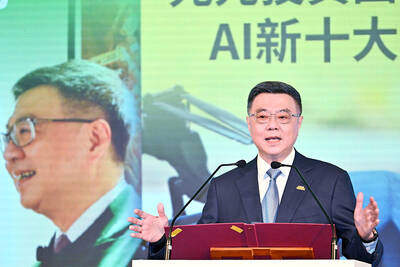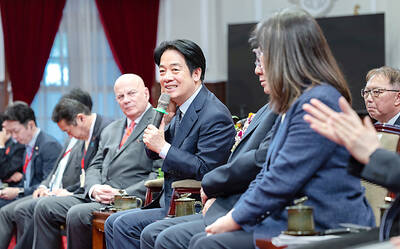Osama bin Laden may be the world's most wanted man, but where his family is concerned, it's business as usual -- big business, that is.
The Bin Laden family, which has close ties with Saudi Arabia's rulers, has been awarded a US$533-million housing project in the holy city of Mecca that has sparked a diplomatic spat between Riyadh and Ankara.
The project, which features building 11 high-rise residential towers with 1,000 apartments and a twin-tower five-star hotel, will be carried out by the Bin Laden Construction Group, one of the kingdom's biggest firms with estimated assets of around US$5 billion.
Covering 23,000m2 and due to be completed in 2005, the project also involves the construction of a modern replica of the Ottoman-era Ajyad fortress that was used for decades to defend Mecca against attacks from rebel tribes and whose demolition last week infuriated Turkey.
The Bin Laden Construction group was founded by Mohammad bin Laden, father of the chief suspect in the Sept. 11 anti-US attacks, in the Saudi Red Sea port city of Jeddah in the 1950s.
The group grew into one of the major firms in the oil-rich kingdom when it was entrusted by the royal court with the task of expanding Islamic holy sites in Mecca and Medina.
The work, costing billions of dollars, enabled more than two million faithful to gather at Mecca's Grand Mosque and a million to pray at the Prophet's Mosque in Medina.
The Bin Laden Construction group also built several palaces in Riyadh and Jeddah for members of the Saudi royal family and carried out restoration work following an arson attack on Jerusalem's al-Aqsa Mosque in 1969.
Salem bin Laden, Mohammad's eldest son, ran the financial empire left behind by his father upon his death in 1968 until he himself died when his private plane crashed in Texas in 1988.
Mohammad bin Laden left 54 sons and daughters from several marriages. Thirteen of his sons sit on the board of the family's firm, the most prominent being Baker, Hassan, Islam and Yehya.
Baker, Mohammad's second son, succeeded Salem at the head of the firm, which has since extended its reach to several Arab countries and employs tens of thousands of people.
The Bin Laden family disowned Osama after he was stripped of his Saudi citizenship in 1994 for suspected terrorist activities and criticism of the Al Saud ruling family.
One sign of the Saudi authorities' confidence in the Bin Laden group came in 1998 when it built a US$150-million facility in al-Kharj, south of Riyadh, for some 4,300 American troops based in the kingdom.
"We have nothing to do with him [Osama]," a family member said, requesting anonymity.
In an attempt to avoid any association with the suspected terror mastermind, one of the Bin Laden group's subsidiaries changed its name in 1999, from Bin Laden Telecommunications to Baud Telecommunications Co.

Two US House of Representatives committees yesterday condemned China’s attempt to orchestrate a crash involving Vice President Hsiao Bi-khim’s (蕭美琴) car when she visited the Czech Republic last year as vice president-elect. Czech local media in March last year reported that a Chinese diplomat had run a red light while following Hsiao’s car from the airport, and Czech intelligence last week told local media that Chinese diplomats and agents had also planned to stage a demonstrative car collision. Hsiao on Saturday shared a Reuters news report on the incident through her account on social media platform X and wrote: “I

STILL ON THE TABLE: The government is not precluding advanced nuclear power generation if it is proven safer and the nuclear waste issue is solved, the premier said Taiwan is willing to be in step with the world by considering new methods of nuclear energy generation and to discuss alternative approaches to provide more stable power generation and help support industries, Premier Cho Jung-tai (卓榮泰) said yesterday. The government would continue to develop diverse and green energy solutions, which include considering advances in nuclear energy generation, he added. Cho’s remarks echoed President William Lai’s (賴清德) comments in an interview last month, saying the government is not precluding “advanced and newer nuclear power generation” if it is proven to be safer and the issue of nuclear waste is resolved. Lai’s comment had

‘BUILDING PARTNERSHIPS’: The US military’s aim is to continue to make any potential Chinese invasion more difficult than it already is, US General Ronald Clark said The likelihood of China invading Taiwan without contest is “very, very small” because the Taiwan Strait is under constant surveillance by multiple countries, a US general has said. General Ronald Clark, commanding officer of US Army Pacific (USARPAC), the US Army’s largest service component command, made the remarks during a dialogue hosted on Friday by Washington-based think tank the Center for Strategic and International Studies. Asked by the event host what the Chinese military has learned from its US counterpart over the years, Clark said that the first lesson is that the skill and will of US service members are “unmatched.” The second

STANDING TOGETHER: Amid China’s increasingly aggressive activities, nations must join forces in detecting and dealing with incursions, a Taiwanese official said Two senior Philippine officials and one former official yesterday attended the Taiwan International Ocean Forum in Taipei, the first high-level visit since the Philippines in April lifted a ban on such travel to Taiwan. The Ocean Affairs Council hosted the two-day event at the National Taiwan University Hospital International Convention Center. Philippine Navy spokesman Rear Admiral Roy Vincent Trinidad, Coast Guard spokesman Grand Commodore Jay Tarriela and former Philippine Presidential Communications Office assistant secretary Michel del Rosario participated in the forum. More than 100 officials, experts and entrepreneurs from 15 nations participated in the forum, which included discussions on countering China’s hybrid warfare